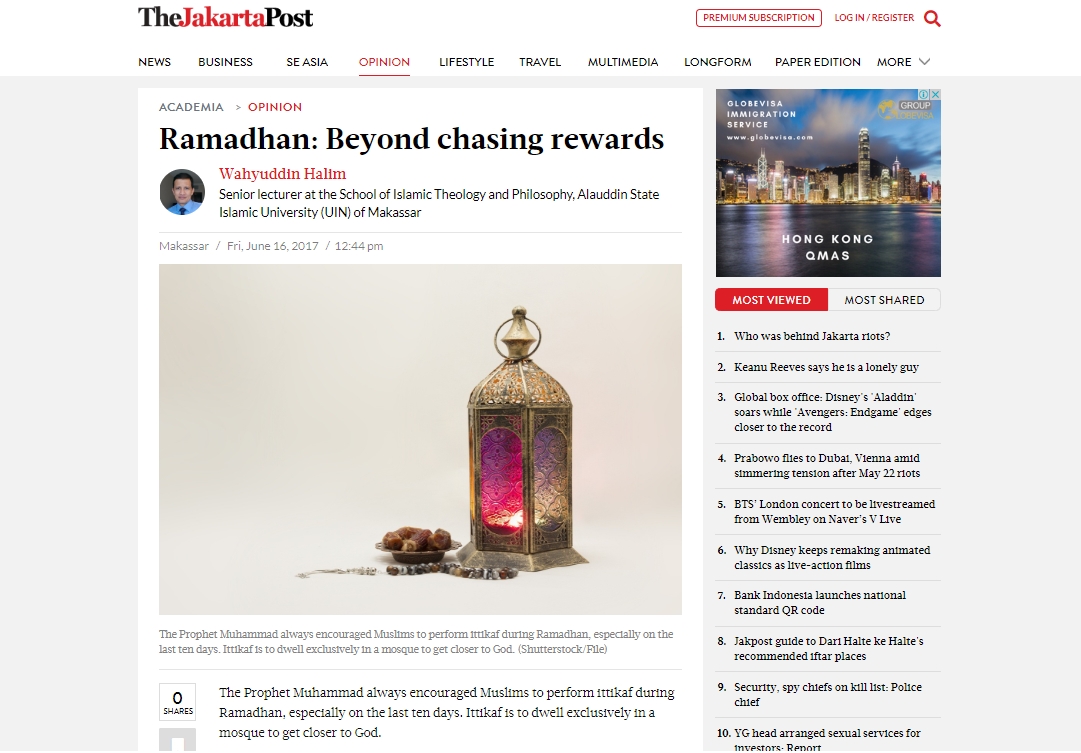The Prophet Muhammad always encouraged Muslims to perform ittikaf during Ramadhan, especially on the last ten days. Ittikaf is to dwell exclusively in a mosque to get closer to God.
The prophet also ordered Muslims to fill the nights of Ramadhan with tahajud(night prayer) and tafakkur (contemplation).
That is why Ramadhan is, in essence, a period of contemplation through which one engages in self-introspection and intense spiritual reflection. After 11 months pursuing material gains and worldly achievements, Ramadhan comes to offer itself as a spiritual break.
In all religions, contemplation is among the most important rites, though practiced in diverse ways and for different aims, such as to be in harmony with nature, to realize the temporality of worldly life and its potential as a source of suffering, to engage in an intimate dialogue with God to gain divine inspiration, or even to “unite” with God through a mystical union.
Contemplation is a spiritual discipline to get a clearer perspective and vision of one’s self, of the universe and of God. It is the most important stage for any traveler to take through their terrestrial journey. The history of great personalities shows a balance of action and contemplation in their lives.
Siddharta Gautama, for example, underwent many years of severe meditation before becoming enlightened. Before receiving the apostolic mission, the Prophet Muhammad lived a contemplative life for several years in the Hira Cave near Mecca. In their lives, harmony between contemplation and action was fully manifested.
The Quran, as in the Surah Al Imron (The Family of Imron) verse 191 and Ar Rum(The Romans) verse 8, defines contemplation, or tafakkur in Arabic, as an effort to deeply reflect on the existence of the universe and oneself, and even God.
According to Aristotle, because of this contemplative talent, human beings are likely to resemble angels and can communicate directly with God. The Prophet once said, “To meditate for one moment is better than to worship for 70 years.”
Contemplative life always requires fasting in varying durations. Fasting is not only abstaining from eating, drinking and sex but also, according to al-Ghazali, speaking, seeing, hearing, touching, kissing and thinking about anything other than God.
According to the psychology of Sufism, only by paralysing the functions of one’s own physical organs is one able to utilize their spiritual faculty to experience the divine presence.
Fasting is the most powerful ritual of curbing or even crippling the wildness of these physical organs.
Having been too deeply plunged into the temporal-material world, humans tend to forget the source and purpose of their creation. Many even end up denying their acknowledgement of their creator.
But human memory and longing for the divine will never completely disappear. For in the human heart is planted a religious seed and a sense of divinity.
“Every person who is uprooted far from his source,” as Jalaluddin Rumi wrote in his masterpiece the Mathnawi, “surely will someday yearn for the moment when he was once united with him.” In the Quran, God himself repeatedly refers to His nature as al-mashir, the last destination to which all creations will terminate.
Therefore the many rituals of Ramadhan aim at orienting every Muslim to practice a contemplative life. Not the contrary, in which many Muslims view Ramadhan as first and foremost a special period in the Islamic calendar to accumulate afterlife rewards through celebrated communal rituals, believed to be multiplied during this month.
This will have no effect in transforming their personal and moral condition. In fact, tahajud, dhikr (repeated short prayers), du’a (prayers) and ittikaf in the mosque are essentially contemplative-oriented rituals.
Tahajud performed in the third half of the night, for example, can create a profound and sacred inner atmosphere, conducive to establishing an interpersonal dialogue with God.
Meanwhile, dhikr is a repetitive recitation of God’s names in order to experience His intimate presence in the heart and mind of the practitioners.
The munajat or du’a, meanwhile, signifies believers’ spiritual poverty before God; the prayers help the practitioners to undermine their arrogance as a result of worldly supremacy.
As a basic element of al-faqr (a despicable feeling before God), fasting is highly favored by the Prophet who once said, “al-faqru fakhri” (spiritual poverty is my pride).
This reflects the great humility and permanent dependence on God of one of the greatest and most sacred men in history.
However, before beginning a contemplative life, one should first perform repentance as a sinner’s prayer will only hit empty space.
After repentance, a person should then control desires and restrain from worldly content, and then practice zuhd (an ascetic life) to finally gain ma’rifah(enlightenment). To pass these stages of spiritual journey requires strong determination to bear the suffering.
But human suffering is actually a gift from God to enable him to see the whole niche of life. “Life,” says the writer SH Nasr, “is only a constant turn of joy and sorrow.”
And only the eyes that are often washed by tears can see the bright light of life. “To progress anew,” wrote Alexis Carrel, a 20th century French philosopher, “man must remake himself. And he cannot remake himself wituout suffering.”
Living Ramadhan through various contemplative actions will enable a Muslim to undergo rebirth, to gain spiritual certitude and vision, and to find intellectual inspiration and imagination to survive the next 11 months in the light of God’s grace.
Fasting works like a fragrance for the human soul whose aroma can be smelled long after the end of Ramadhan. It is also God’s annual blessing to rejuvenate one’s energy.
(First published as opinion in the Jakarta Post on June 16, 2017)
http://www.thejakartapost.com/academia/2017/06/16/ramadhan-beyond-chasing-rewards.html
Author; Wahyuddin Halim
Senior lecturer at the School of Islamic Theology and Philosophy, Alauddin State Islamic University (UIN) of Makassar


